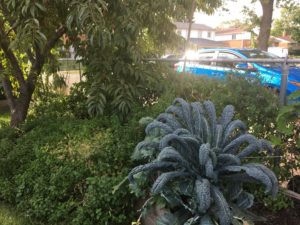by Rabbi Robin Damsky~
While I do a great deal of writing for In the Gardens – our nonprofit that brings organic edible gardens to greater Chicagoland, donates 80% of our produce to the hungry and teaches mindfulness practice – when thinking about Elul, I had to dig in, no pun intended, for what to say. Modafinil pill http://www.modafinilpill.net/buy-modafinil/
Because it’s not just about sharing the love of gardening or teaching about sustainable and healthy food. It’s about creation and our future. It’s about living on the earth as an interconnected whole. For me, this is the main message of the High Holy Days.
In the last two years I have put extensive energy into separating my growing food from the local critters. An 8’ high deer fence last year. Coyote urine this year. Chicken wire inside the chicken wire. Deer, rabbits, skunks, and others have found their way to our permaculture garden site. I think they are handing out flyers. Sure, I expect some sharing with the birds and squirrels, and more than half my property is open to the critters. Only a small area is fenced. But if it weren’t, there’d be no food for the hungry in the food pantry. Viagra online http://healthguidesdaily.com/buy-viagra-online.html
In a conversation with a friend, we spoke about the increasing problem of deer and other wildlife in our backyards. It’s a paradox. Driving through the forest preserve I see a fawn cross the street on wobbly legs. I am honored. I look through the rear view mirror as I pass, and see a sibling crossing behind. Wow, I think, two of them! Where’s mama? I wonder. The same deer that delight me on my travels plague me in the garden. Then there are all those natives we planted, the pollinators for the bees and butterflies. I have so many varieties of bees, wasps, moths and butterflies, birds previously unseen here. I seek them out. I plant for them. Their future is my future. Again, that paradox.
So I think: something is amiss.I don’t mind an occasional peach gobbled or some blackberries munched, but I want to have our farm’s goodies picked by our own hands. Yet I also have to acknowledge that my neighborhood, my home and the homes around me, encroach more and more fully on the homes of our wildlife neighbors. Their space and food sources dwindle, so they come after ours.
What’s the answer? I have written before on Thoreau’s planting an extra row of beans for the deer. They need more than one row, however. Do we invest in expanding and replanting our wild spaces so the critters have more of their natural diet available? As we plant more prairies and native gardens, are we recreating habitat for our wild friends? And if so, is it enough? How about how we live? Do we redesign our towns and cities so that nature and homes are more fluid? There are many who set their homes in or bordering on wild places. They know that they are the outsiders, expecting all kinds of wildlife. But cities and suburbs don’t plan for this, at least as of yet.
What would a town look like that has been designed for wildlife and humanity to live together? Do we plant hedges, or whole gardens, for the deer and skunks, raccoons and opossums? What about the coyotes, bears and snakes? It could get complicated.
But I think that if we are serious about a healthy, balanced planet helping the brilliant, diverse ecosystem that God created to flourish, we have to start thinking about ways to live with our wild friends that sustain them and allow us to sustain us. We must remember that we are one natural world.
This is the question I pose this Elul. How can we make sure the deer and their buddies (and predators) are taken care of while we take care of ourselves? There are many ecological organizations devoted to preserving species and natural lands, thank God. Yet it is more basic than that. It is right here in our own backyards, literally. I don’t know the answer. But it is a question of tikkun I am choosing to engage. I invite you to engage it with me.
© Rabbi Robin Damsky
Robin Damsky is the founder and executive director of In the Gardens, http://inthegardens.org. She is also the rabbi of Temple Israel Miller in Gary Indiana, http://templeisraelmiller.org.


